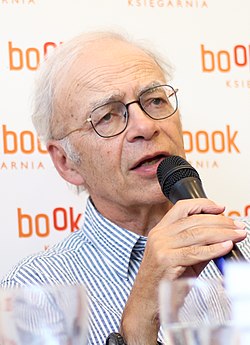Peter Singer Quote
Effective altruists do things like the following: •Living modestly and donating a large part of their income—often much more than the traditional tenth, or tithe—to the most effective charities; •Researching and discussing with others which charities are the most effective or drawing on research done by other independent evaluators; •Choosing the career in which they can earn most, not in order to be able to live affluently but so that they can do more good; •Talking to others, in person or online, about giving, so that the idea of effective altruism will spread; •Giving part of their body—blood, bone marrow, or even a kidney—to a stranger. In the following chapters, we will meet people who have done these things.
Effective altruists do things like the following: •Living modestly and donating a large part of their income—often much more than the traditional tenth, or tithe—to the most effective charities; •Researching and discussing with others which charities are the most effective or drawing on research done by other independent evaluators; •Choosing the career in which they can earn most, not in order to be able to live affluently but so that they can do more good; •Talking to others, in person or online, about giving, so that the idea of effective altruism will spread; •Giving part of their body—blood, bone marrow, or even a kidney—to a stranger. In the following chapters, we will meet people who have done these things.
Related Quotes
About Peter Singer
On two occasions, Singer served as chair of the philosophy department at Monash University, where he founded its Centre for Human Bioethics. In 1996, he stood unsuccessfully as a Greens candidate for the Australian Senate. In 2004, Singer was recognised as the Australian Humanist of the Year by the Council of Australian Humanist Societies. In 2005, The Sydney Morning Herald placed him among Australia's ten most influential public intellectuals. Singer is a cofounder of Animals Australia and the founder of the non-profit organization The Life You Can Save.
